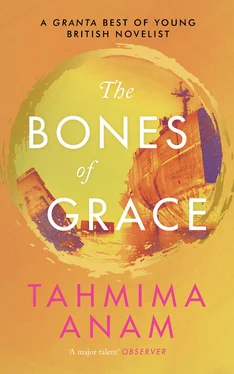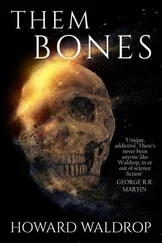We came back from the Sundarbans with plastic bottles of forest honey, promising to write to the German couple. ‘Let’s get an email address,’ you said. ‘That way we can write to people together. As one.’
Despite all of this, you were a stranger to me. When I asked you what the future held, your answers were baffling. You were still not sure if you wanted to return to graduate school. You said you wanted to make a collage replica of the Liberty Bell. A sculpture out of captured air from every country in the world. You wanted to write a piece of music that would sound the same whether you played it forwards or backwards. You wanted to sing a different song to me every morning when I woke up, all beginning with the sentence ‘Your mouth smells like honey.’ You wanted to play the piano for forty-eight hours straight. You wanted to have twelve children and name them after jazz musicians. You wanted to learn Bangla and watch the films of Satyajit Ray in their original language. You wanted to crowdstitch a piece of cloth that went all the way around the world. Your intensity was contagious, and when I was with you I was brighter and smarter and everything about the world was terrifying, because it was all possible, and this made the prospect of parting with you seem violent, and also a little comforting, because who could live like that all of the time, sick with wanting, everything but the two of us dull and irrelevant?
On the bus back from Khulna, I felt a tiredness in my legs, the last two weeks coming back to me in slow motion. Days in bed. The mangrove, the guides pointing out Orcaella brevirostris , the pink river dolphins that swam beside the boat, and the crocodile we saw sunning itself on the bank of a tributary. You had a habit of waking up early, though through silent agreement you were always back in bed before I got up. ‘I went for a run,’ you would say, or ‘I was meditating.’ The hair on the back of my head was matted and tangled. You have a love dreadlock, you said, carefully pulling out the knots with a comb and a small dish of coconut oil.
You frequently mentioned the piano. You believed it was built in a factory in Queens between the two world wars — the best Steinway years, in your opinion; it had a warm, milky tone you had never heard before. Wasn’t there some way we could get the piano out of Grace to restore it properly? With a lot of care, the instrument could be returned to its original sound, the one it was meant to produce, a timbre that contained all of its history, its travels across continents and decades, enduring the tides of oceans and time.
I asked you why you loved me and you said love’s arguments are always teleological. You love someone because you already love them. You love their particular qualities, because you love them in the wholeness of their being. And because you love them in the wholeness of their being, you love the things about them that wound you.
You quoted Rumi: ‘The wound is where the light enters you.’
‘This was a more complicated answer than I bought,’ I said. ‘I was going for the five-dollar answer.’
‘The five-dollar answer is: I don’t know. But I love you despite, perhaps because, you break my heart.’
‘If you had a choice, perhaps you would choose to love another person. A better person.’
‘Maybe.’
One day, I suggested I might be able to meet you in Cambridge in the fall. I could go back and talk to my adviser, figure out if there were some way to write up the Ambulocetus data without access to the fossil itself. We were in the middle of a card game. You threw the cards on the table and I thought it meant the game was over and you had won, but instead you went into the bedroom and slammed the door. When I followed, I found you inside the mosquito net with the sheet pulled over your face.
‘What’s going on?’
‘Get out,’ you said.
‘I haven’t done anything,’ I said. I knew, as the day of your departure approached, that it was getting harder for you. ‘But I’m sorry anyway.’
You dragged the sheet away and sat up. ‘What did you think was going to happen when you made me come?’
‘I don’t know.’ I had taken off my wedding ring and stuffed it into the back of my underwear drawer, but I often caught you glancing at the pale double band of skin that marked where they had been. I don’t know what I thought was going to happen. We didn’t utter the word ‘divorce’. The faces of my parents and Rashid and Dolly and Naveed were all blank, everyone a ghost except you. ‘I just wanted to see you, to be near you.’
‘Don’t ruin it,’ you said.
‘How am I ruining it?’
‘I’m not having an affair with you.’
‘What do you think this is?’
‘This can’t be what we’re doing, Zubaida.’ Your lips were drawn tight around your mouth, and I could tell you were trying to keep from shouting at me. ‘It has to be better than that.’
‘You never propose an alternative. You never say, “Come to Cambridge, we’ll live together on Prospect Street, I’ll play the piano at Ryles, you can teach, we’ll buy brownie mix at Trader Joe’s.” Why don’t you do that? Paint a picture, Elijah. Tell me what it’s going to be like.’
I hadn’t known, until that moment, how much I had resented your not doing all that work for me — making it real, making it comfortable. I was raising my voice now, and for a minute, as you moved inside the mosquito net, I thought you might climb out of there and leave the room and run away from me, but you pounded your fist against the pillow so hard that the whole room seemed to shake, so I went in after you and lay down on top of you while you sobbed, my hands braided through your hair.
We argued again the next day, about Mo. I had seen the way his eyes followed you around the room, the way he mouthed words after you had said them. He arrived to make lunch for us and there was something about the way he held himself that seemed defeated, as if he had just failed an exam or lost his favourite trinket — I knew he liked to hoard things he found on the ships, that he had a collection of tiny objects, a brass compass, the cap of an expensive pen, the broken clasp of a necklace — so I asked if I could help him prepare the food. When he hesitated, I confessed I was a terrible cook, and he relented then and gave me some instructions, showing me how to cut the okra diagonally while he peeled a small pumpkin.
We worked together in silence for a while. Then Mo said, ‘Will you and Bharmon get married soon?’
His delicate elbows were resting against the sink. I said: ‘In foreign, people don’t marry so quickly.’
‘In Desh they do.’
‘You want to get married someday?’
He blushed. He had recently shaved his head, and I saw the colour rising up around his neck and his small, pointed ears. ‘As soon as I can marry her, I will,’ he said. I asked him to tell me who, but he refused. He passed me a bigger knife. ‘Apa, now cut the begun,’ he said, passing me an eggplant. Then he squatted in front of the black stone pestle and began crushing an onion. As I began working on the eggplant, he said, ‘You lived in bidesh?’
‘For a long time, yes. I was a student in America.’
He finished the onion and started on another, passing the heavy black rolling pin over it and pulling it back towards himself, back and forth, till it disintegrated into a pale lilac mush. His eyes watered, and he moved his head so he could brush his face against his shirt. ‘I want to go there,’ he said. ‘Do you think Bharmon will take me?’
‘I don’t know.’
‘He said he loved my cooking.’
I started to understand something. I left the eggplant and crouched beside him. ‘I don’t think so,’ I said, noticing how small his arms were compared with the rolling pin, how narrow his feet as they rested against the stone. ‘It’s very difficult to take people to foreign.’
Читать дальше












